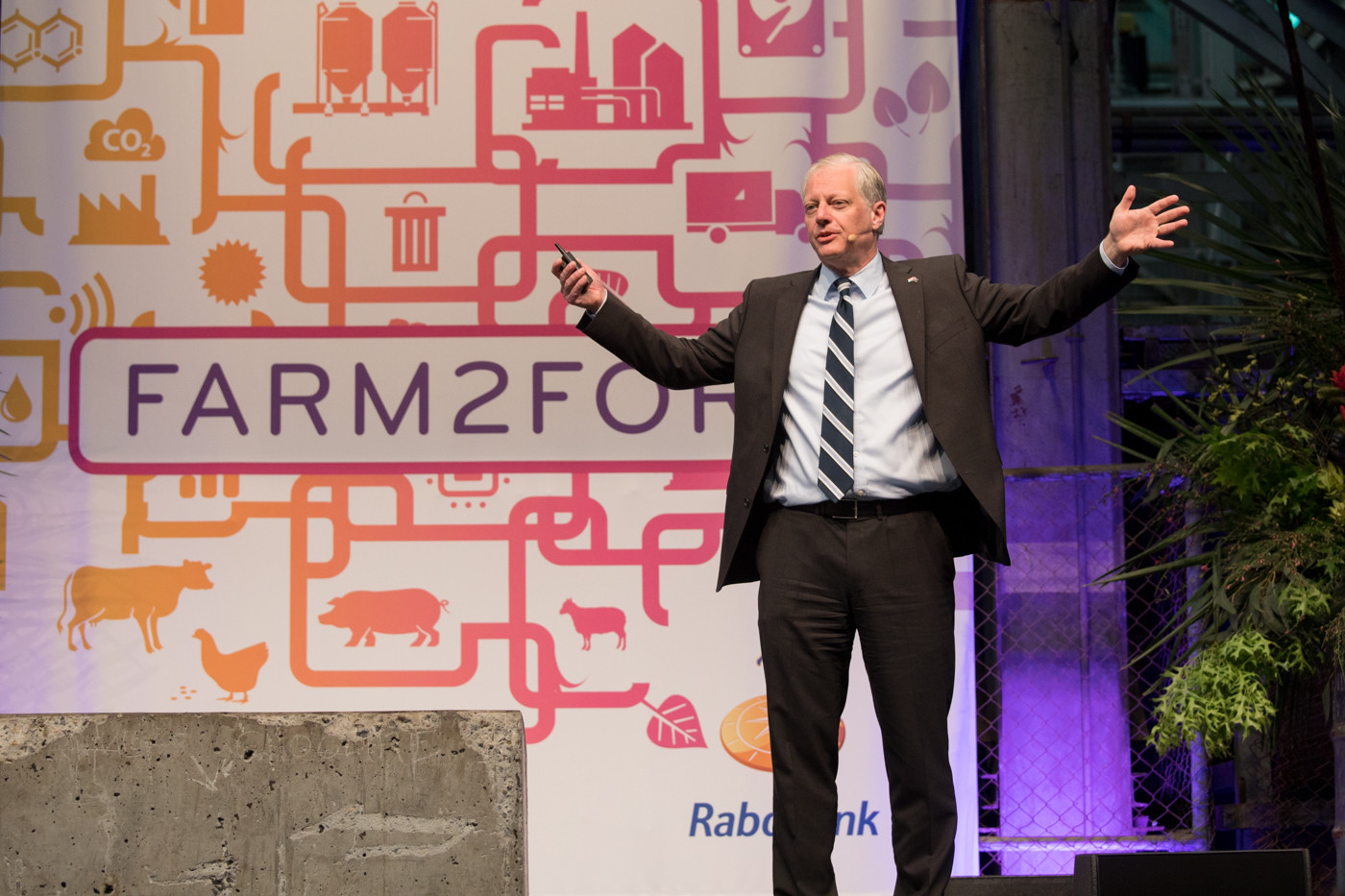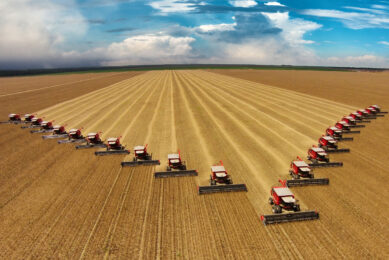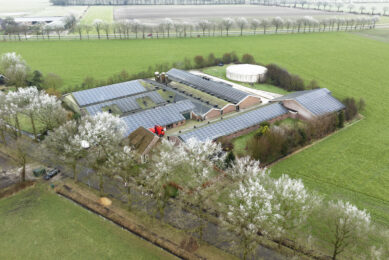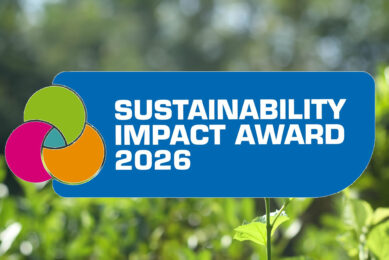Future farm sustainability: Value or volume?

More than 1,200 farmers and food and agribusiness industry stakeholders from around the world attended the Farm2Fork Summit held on November 3 in Sydney, Australia.
Hosted by Dutch agricultural bank Rabobank, the event brought together delegates and speakers from across the sector with a focus on food and agri tech and innovation and its role in feeding more than 12 billion people by 2100. Netherlands-based Rabobank Group executive board member Berry Marttin told the summit that innovation was the only way the world would be able to rise to this challenge.
“The reality is we don’t have any more resources and land available so the only way we will be able to feed that many people is to develop new technologies and invest in innovation, to increase yields and to do things in a smarter way,” he said. Marttin said the era of the chemical revolution in increasing yields in agriculture was passing, with the sector now needing to look at new ways to increase production. “We need to go to the next generation of ideas and we need to use technology and to use nature to do that,” he said.
Creating value for the farmer
Farmers have been told for decades now that efficiencies and increased productivity will be essential for ensuring farming profitability for future generations. However, addressing the summit, Rabobank Global Strategist Farm Inputs, Food & Agribusiness Research & Advisory Dirk Jan Kennes said that their latest research was pointing toward a fork in the road for farmers. “Traditionally the objective of farmers has been to intensify because of the need to produce more with less to feed people in the developing world that struggle to meet their caloric intakes,” Kennes said. “However, we are seeing a different set of demands coming from a more affluent consumer. “Companies are seeking to create value by marketing a different production process such as non-gmo corn, non-antibiotic meat production and organic.”

Kennes said that while there is value to be had in addressing the demands of these more affluent consumers the challenge will be to ensure this value is delivered to the farmer. “Consumers want choice and consumer choices are transferred into value creation, farmers will have a choice either to create value or create volume,” he said. “I do believe that it will be possible to create value by going directly to the consumer but farmers will need to work through the network of food processors, retailers, food service providers and consumers if they intend to work in an international environment.” Brazilian cattle producer Pedro Merola is a farmer who has taken big steps in bridging that divide between farmer and consumer with his concept butcher shop FEED in São Paulo. FEED has redefined the experience of shopping for meat in São Paulo and has brought a feel of luxury to a task that may have previously been viewed as mundane. “Our goal at FEED is to create a relationship with our consumers for life,” Merola said. “We want to improve the satisfaction that consumers get when buying, cooking and eating our meat and that begins at the farm.”
Merola is a fifth generation beef producer who has used technology and innovation throughout the entire supply chain to deliver consumers a product that they find very desirable. “We use breeding, feed planning and genetics to ensure we deliver a consistent quality of meat,” he said. “We then ensure we use the best cuts to enhance the meat and we use recipes and cooking classes to educate consumers on how to cook these cuts. “The flagship store is all about creating a fun and pleasurable experience for the consumer, we have customers who spend 30 minutes here every week but also those who will order over the phone as we can deliver within two hours to anywhere in the city.” Merola is a prime example of a farmer creating value throughout his own supply chain but having access to an affluent client base in São Paulo has made the process a feasible one. For farmers in developing nations, many of which are in Africa, the focus for innovation will continue to be on increasing productivity.
Building volume in developing nations
Africa is a continent that will play an important role in the future nutritional demands of the world. With its population predicted to double by 2050 there will potentially be 2.4 billion citizens to feed, and while Africa is currently a net importer of food this will need to change if these demands are to be met. According to Managing Director Africa and Middle East for AGCO Corporation Nuradin Osman it is a challenge that can be met but requires significant investment and commitment from both government and private enterprise. “Currently in Africa only around 35% of farms are mechanised, with only 10% of that figure being fully mechanised,” Osman said. According to him the move to mechanisation has been limited by knowledge, accessibility and affordability, AGCO is using innovative solutions to address these factors. “A tractor’s lifecycle in Africa on average is only eight months, compared to Brazil which is 14 years and the UK which is 21 years,” he said.

“Our goal is to improve this to seven years by 2021.” Along with developing local manufacturing plants AGCO has invested 25 million dollars into a Future Farms training centre designed to support the move to mechanisation. “650 people went through our Future Farms this year, we have trained 300 mechanics and trained 325 people in basic agronomy and product training,” Osman said. “Our goal for next year is to double that to 1,200 and in the next five years we intend to have 10,000 farmers and mechanics trained.” Osman said while AGCO saw the training of mechanics as essential to improving the lifetime of tractors in Africa they are also looking at innovative ways to address affordability. “At the start of next year we will launch a platform that will be like Uber for tractors,” he said. “We are partnering with a company called Hello Tractor and a mobile provider to enable farmers to only pay for the use of a tractor when they need it.

“However the success of this endeavour will still depend on knowledge, we will continue to provide good agronomy knowledge through our farming training and that will help us to accelerate the scheme. “Next year we will start with 100 tractors and we intend to double that every year to increase the rental area of our machinery.” Osman is confident that through investment in capacity building Africa will eventually be capable of feeding its growing population. “Africa has everything it needs to feed itself, it has the water, it has the land, it has the rain all it needs is the knowledge and that’s what we’re trying to provide,” he said.
The balance of environment and production
While increasing volume for developing countries is critically important to food sustainability, farming profitability in developed nations will also continue to rely on increasing yields. The Farm2Fork event hosted by the King and Queen of the Netherlands with King Willem-Alexander providing a keynote address. The King highlighted the progress that the Netherlands had made in agricultural production despite its relatively small size. “Our country is smaller than Tasmania, its soil isn’t especially fertile and the climate isn’t ideal either and yet we are the second highest agricultural exporter on the planet,” he said. “Living in a tiny, densely populated country forces you to be innovative and inventive, with more than 400 people per square kilometre we have had to build compact/smart cities and make careful use of limited space.

“Innovation is what makes Dutch productivity in agriculture and horticulture five times higher than the European average, that’s five times the yield per acre using less energy and less water.” However, while King Willem-Alexander admits to celebrating the Netherland’s successes, they continue to face the challenges of other developed nations. “Food production accounts for one-third of global energy consumption, half of the world’s usable land surface and two-thirds of its fresh water supply, in the future this simply won’t be tenable because the world’s population is going to keep growing and then there’s the problem of narrow profit margins in the agricultural sector. “Many farmers running family businesses are worried, will their sons or daughters be able to take over from them, this is a pressing issue in both Australia and the Netherlands. “We need to find solutions together and we will find them if we keep innovating.” There were in fact a number of innovations presented at the Farm2Fork Summit that addressed agricultural pain points and provided potential value-adding opportunities for those that attended. However, perhaps the greatest opportunity was for like-minded business owners and entrepreneurs across the world to come together in what will hopefully inspire accelerated innovation across the food and agricultural industries in the coming years.











